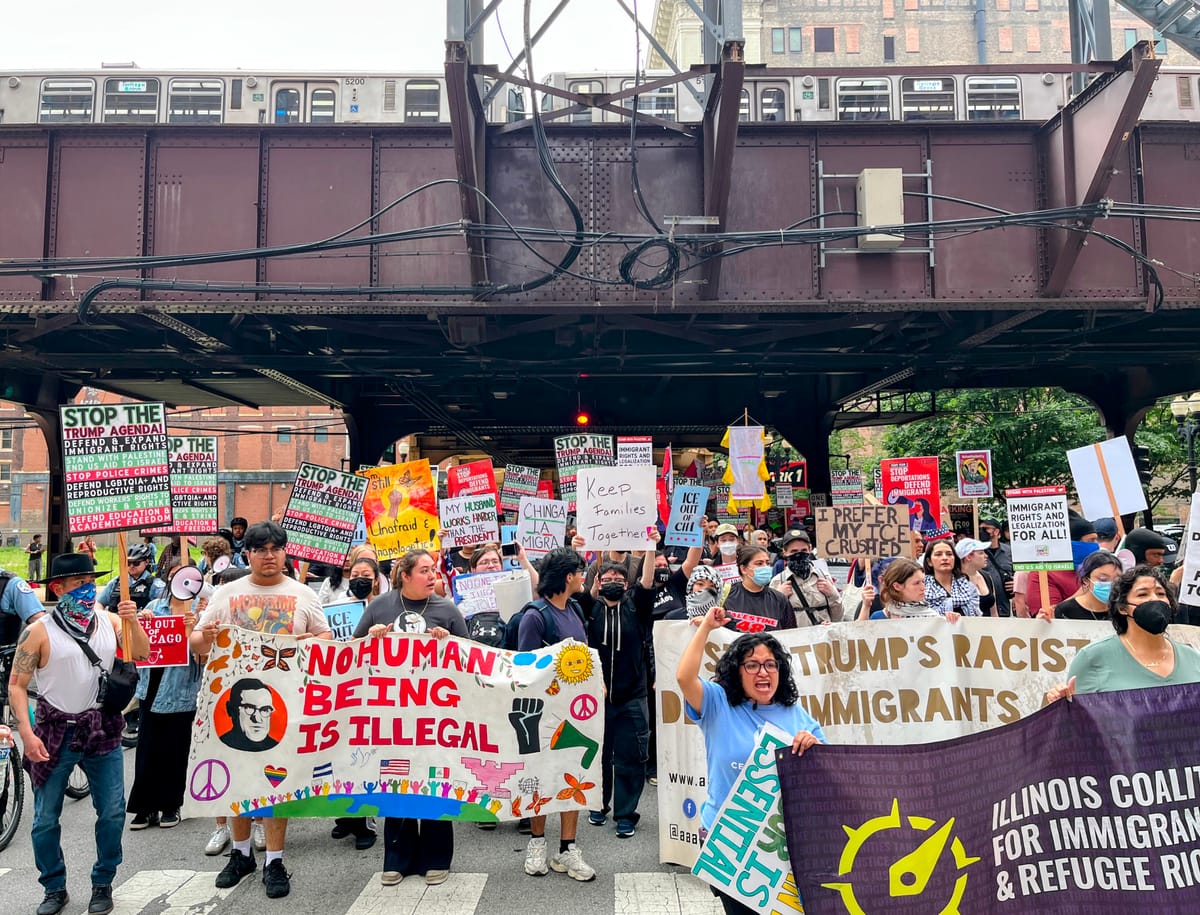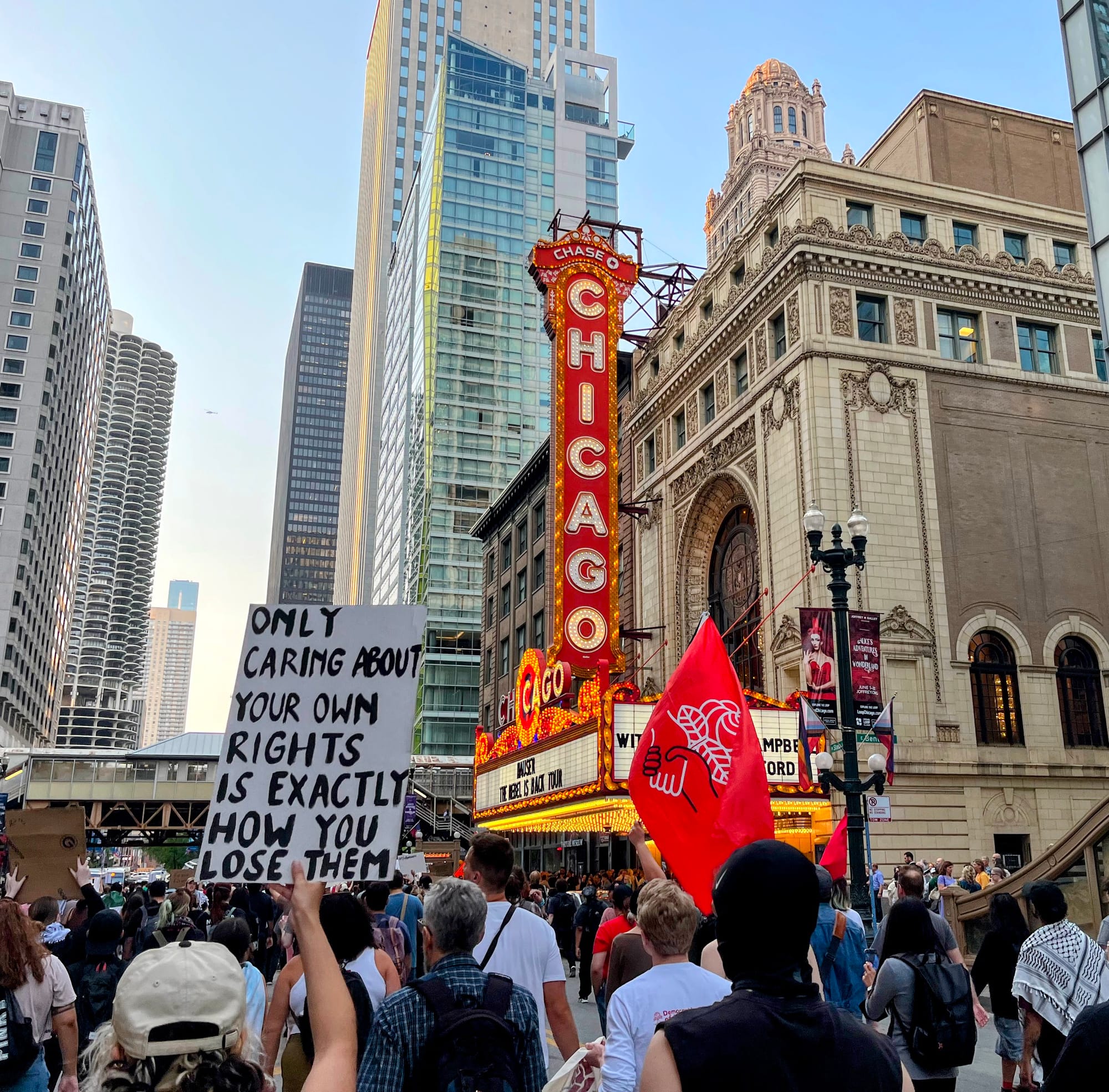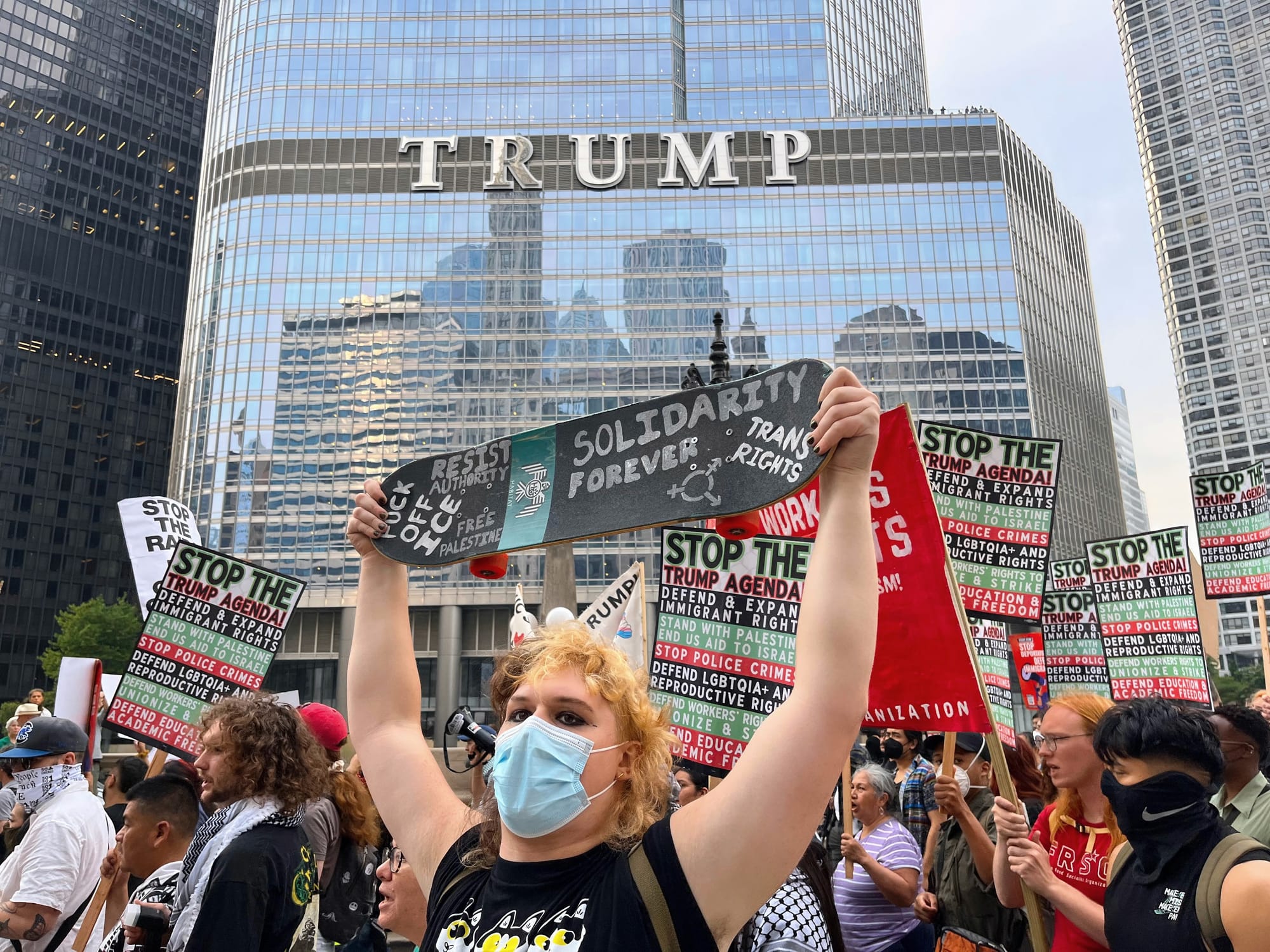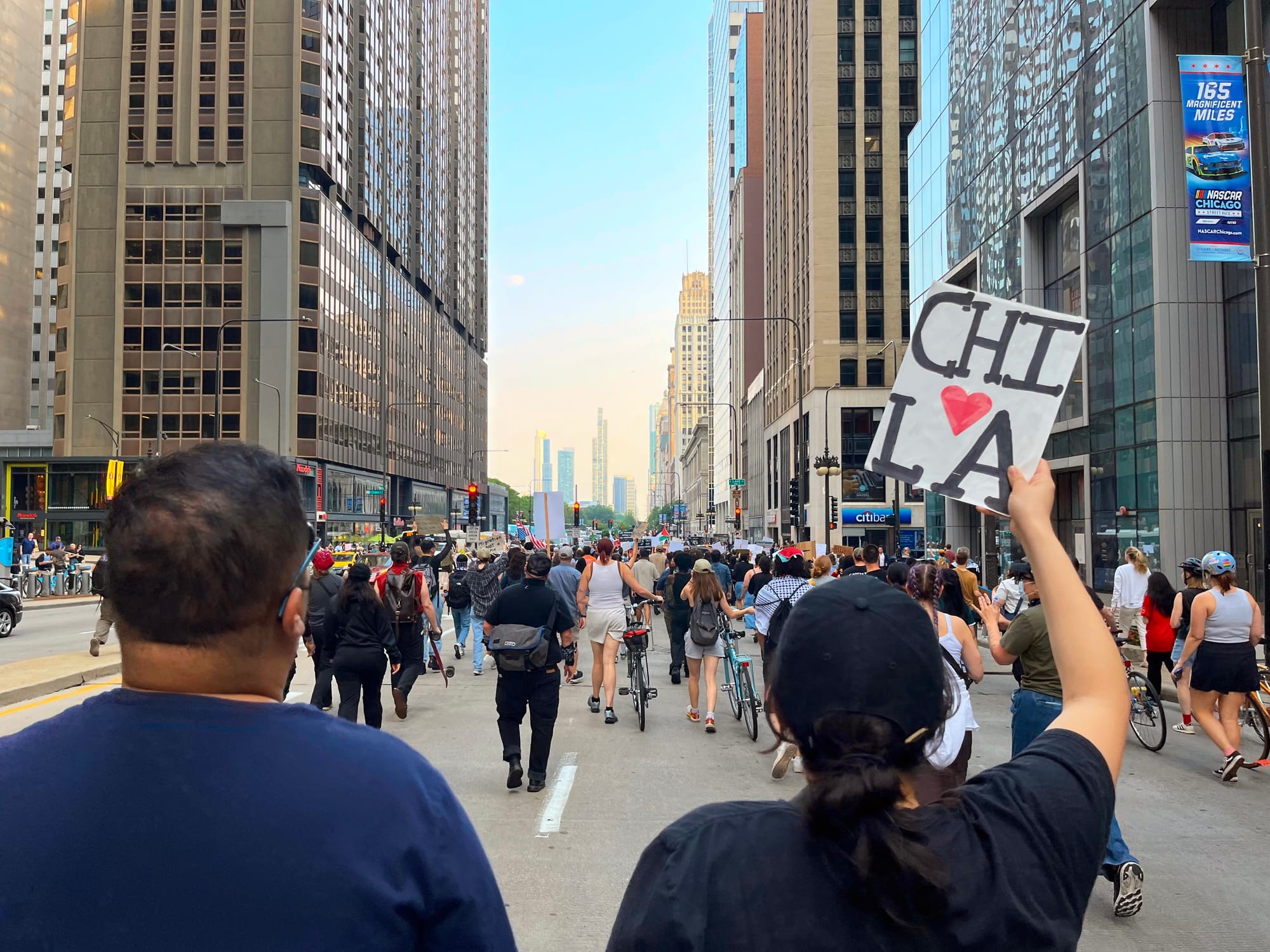Must-Reads and Some Thoughts on This Moment of Mass Protest
"What do you want people to know, and what do you want them to do?"


Greetings friends,
If you’re here for my thoughts on the last week of mass protest, scroll down. If you’re here for the must-reads, you can begin at the beginning.
Must-Reads
- The Los Angeles Protests Are an Act of Self-Defense by Melissa Gira Grant. “The politicians want to define protest as merely voicing a demand without disrupting anything; they don’t want to recognize the value of putting one’s body between the state and the scapegoated.”
- ICE Raids in Los Angeles are a Declaration of War, and Angelenos are Primed for Battle by Tina Vásquez. "Our communities are composed of people who traversed borderlands with nothing more than a backpack, successfully fleeing civil wars, political persecution, dictatorships, state violence, and their own futures—and we are their children."
- CBO: GOP Bill Would Sap $1.6K From Poorest Households, Give $12K to the Richest by Sharon Zhang. “The bill would represent a staggering and historic transfer of wealth from the poorest in the U.S. to the richest households — taking money away from the Americans who need it the most and giving it to those who need it the least.
- Mutual Aid in the Age of Fascism by Judith Levine. "If we are to have any hope of surviving the coming dark age, we need mutual aid—not just to keep people housed and fed, but to keep them connected."
- The Theocratic Turn by Scot Nakagawa. “We are witnessing a global phenomenon, the rise of theocratic movements across virtually every major faith tradition. From Modi's Hindu nationalism in India, to Erdogan's Islamist authoritarianism in Turkey, to the Taliban's return in Afghanistan, to the Christian nationalist movement here in the United States, religious authoritarianism is surging worldwide.”
- LA Community Organizer Describes Hourslong Street Battles Against Border Patrol by Amy Goodman. “‘After eight-and-a-half hours of battle — and it was a battle, because there were people throwing back tear gas, people throwing anything that they could to defend themselves and to defend the workers that were being surrounded by over 100 Border Patrol agents. After eight-and-a-half hours, the Border Patrol, the sheriffs had to retreat,’ [said Ron Gochez.]”
- 'Ticking Time Bomb': Study Says Ocean Acidification Crossed Planetary Boundary by Jessica Corbett. “As this year's United Nations Ocean Conference began in France on Monday, scientists published a study showing that another ‘planetary boundary,’ or barriers that ensure the Earth is a ‘safe operating space for humanity,’ has been crossed.”
- The Weaponization of Waymo by Brian Merchant. “These are technologies that are at best agnostic to the communities and environments they operate in, and more often are extractive.”
- Displaced Again and Again, Gazans Ask: Where Do We Go? by Hend Salama Abo Helow. “Gaza is facing a new wave of annihilation, more severe than ever. People are collapsing one by one, family by family, generation by generation. Layers of torment and anguish are compounded, and if the ceasefire isn’t reinstated to save those who remain alive, Gaza will vanish.”
- FDA Approved — And Ineffective by Jeanne Lenzer and Shannon Brownlee. “Citing the need for 'flexibility' and the importance of encouraging drug development when there are few treatment options, the agency has all but abandoned its hard-won standards for sound science, according to numerous experts.”
- Trump Shifts Deportation Focus, Pausing Raids on Farms, Hotels and Eateries by Hamed Aleaziz and Zolan Kanno-Youngs. This piece was published late Friday night and reports that ICE has "abruptly shifted the focus of its mass deportation campaign, telling Immigration and Customs Enforcement officials to largely pause raids and arrests in the agricultural industry, hotels and restaurants, according to an internal email and three U.S. officials with knowledge of the guidance."
ICYMI
This week, I talked with author and organizer Silky Shah about immigration raids, rising authoritarianism, mass protest, innocence narratives, and what it means to organize effectively in this moment. We made this episode as a resource for this moment, and I hope you find it helpful.
Another resource that might be helpful right now is chapter six of my book with Mariame Kaba, Let This Radicalize You. Yesterday, Mariame and I published the chapter, “‘Violence’ in Social Movements” in its entirety in my newsletter. We hope you will read and share it, as we believe it offers some necessary context and grounding amid the current discourse about “violence” and nonviolence.
This week, some of my thoughts were also included in a Teen Vogue piece about lessons from 2020 and how to keep going under the strain of a second Trump administration.
The View From The Streets

Like many of you, I have been in the streets protesting this week. While Customs and Border Protection flies predator drones over the L.A. protests, Israel attacks Iran, and the Trump administration refuses to release Mahmoud Khalil, despite a court order, there is plenty of cause to protest.
After sending 4,000 National Guard members and 700 Marines to L.A., the Trump administration has signaled that it plans to use the National Guard more broadly to facilitate its mass deportation agenda and to further suppress protests.
Meanwhile, Republicans in Congress are doing their part to make the situation worse. In addition to causing 51,000 preventable deaths each year, the Republican budget would also allocate $45 billion for new immigration detention centers—a 364% annual increase in construction funds that would raise the number of available detention beds to at least 125,000. The budget would also devote an additional $27 billion to immigration enforcement and deportation. That’s enough to hire 10,000 more ICE agents over the next five years.

On Tuesday, Trump also emphasized plans to “wean [states] off” FEMA. Trump and Homeland Security Secretary Kristi Noem have repeatedly alluded to plans to dismantle the Federal Emergency Management Agency, which provides emergency relief in the wake of disasters. Trump stated Tuesday that he wants to “give out less money” and for funds that are distributed to come directly “from the president’s office” or the Department of Homeland Security. Such an arrangement would strengthen Trump’s position when tangling with Democratic governors whose constituents are in desperate need of disaster relief. It would also put some municipalities in the position of bargaining with disaster capitalist billionaires in the wake of catastrophe. Could this be the path to the “patchwork” of corporate fiefdoms that Curtis Yarvin longs for?
Meanwhile, approximately 6,700 soldiers, 150 military vehicles, and 50 aircraft will be mobilized in a fascist spectacle in Washington D.C. today, as the president celebrates his 79th birthday. Officially, the parade marks the 250th birthday of the U.S. Army, but Trump made his desire for this kind of spectacle public eight years ago, and now, he’s getting his birthday wish.
People of conscience around the country will also take to the streets today at No Kings protests. Organizers describe the events as “a national day of action and mass mobilization in response to the increasing authoritarian excesses and corruption of the Trump administration.”
I plan to attend the No Kings protest in Daley Plaza in Chicago.
I suspect this will be an intense summer of protest. I am ready to do my part and support mass mobilizations as they arise, and I hope you are, too. As people have taken to the streets to defend their communities, in California and elsewhere, some have voiced concerns (and commands) about how people protest, insisting that if protesters do not remain “peaceful,” Trump will escalate. I addressed these arguments in my conversation with Silky Shah, and I believe they are further addressed by the chapter of Let This Radicalize You that Mariame and I shared yesterday. One protest critic responded to the chapter (presumably without reading it) on Bluesky by declaring that upon resorting to property destruction, I would become “a villain in a MAGA campaign commercial.” (I’m not sure how I became an active vandal in this person’s imagination, but I make no moral distinction between myself and those who break things, so, whatever.) I found this argument comical, given that by virtue of my identity, as a queer, non-binary Native person—not to mention a longtime activist—I am already “a villain in a MAGA campaign commercial.” Just as a Black person does not have to participate in violent acts to be characterized as violent, criminal, or inherently deserving of punishment, a person like me doesn’t have to break anything to be portrayed as a threat.
Every trans person is “a villain in a MAGA campaign commercial.” So is every immigrant, for that matter—and every protester challenging Trump’s fascism.
When the president is reposting theories about Biden being replaced by a robot, how can anyone believe right-wing propaganda is something they can control?

My worries, in this moment, are not about whether someone will pick up a can of spray paint or burn another Waymo. I am worried about the safety of my neighbors who are being hunted by ICE. I am worried about the safety of protesters in the streets—who, by the way, could not kick tear gas canisters back at police if those canisters had not been fired at them in the first place. I am worried about this budget, and how it could supercharge the war being waged on our communities right now, and about the tens of thousands of people who could die due to cuts to essential services. I am also worried about the state of our resistance.
Protest is deeply important, but we need to do so much more. In this moment of mass mobilization, and throughout this highly politicized summer, we have to offer people paths into sustained movement work. We need to build organized power.
When we marched through the streets of Chicago on Tuesday, the defiant energy of the crowd was profoundly exhilarating. But energy is not infrastructure. We need moments of mass mobilization to serve as launch points. That means we must welcome people into ongoing political projects. I believe this will be a politically energetic summer. It’s a time for political education and a time to issue meaningful invitations. We cannot afford to fall into the recurring cycle of calling march after march, assembling people to generate the same imagery, feelings, and dynamics they experienced last week, without building and fortifying sustainable vehicles for struggle. As Olúfẹ́mi O. Táíwò said in Teen Vogue this week, “There's really no substitute for being able to mount a long-term political struggle, and that means there's no substitute for the kind of organizations that can do this.”

So let’s focus on the political education people need right now, and the paths into movement we can take and direct people toward. What do you want people to know, and what do you want them to do? What resources can you share toward those ends? It’s been one of my goals in recent weeks to focus more on invitations than expectations. I constantly ask myself what I can share with people to enable or inspire them to do what I believe must be done. We should all be thinking in those terms, whether we’re organizers or not.
But of course, I will also be protesting. Direct action was my first love. If people are marching for justice, I want to march with them. If they are staring down the police, I want to strengthen their numbers. I am always unequivocally on the side of those taking action to challenge our enemies. I’m also thinking about where we can go together, what we can build, and how we can emerge from this moment stronger, instead of burnt out and battered, with nothing to show for our efforts.
Anyway, if you’re marching in downtown Chicago today, I’ll see you in the streets.
Much love,
Kelly
P.S.
I have another piece coming tomorrow—a Father’s Day reflection I’ve been planning to write for a few weeks now. I promise I won’t normally hit you with so many back to back emails. I’ve just had a lot to say and share this week. I hope some of it’s been helpful.
Organizing My Thoughts is a reader-supported newsletter. If you appreciate my work, please consider becoming a free or paid subscriber today. There are no paywalls for the essays, reports, interviews, and excerpts published here. However, I could not do this work without the support of readers like you, so if you are able to contribute financially, I would greatly appreciate your help.




